Seyoum Mesfin Gebredingel was an Ethiopian politician and diplomat. He was Ethiopia's Minister of Foreign Affairs from 1991 to 2010 and served as Ethiopia's Ambassador to China from 2011 to 2017.

The Eritrean–Ethiopian War,also known as the Badme War,was a major armed conflict between Ethiopia and Eritrea that took place from May 1998 to June 2000. The war has its origins in a territorial dispute between the two states. After Eritrea gained independence from Ethiopia,relations were initially friendly. However,disagreements about where the newly created international border should be caused relations to deteriorate significantly,eventually leading to full scale war. According to a 2005 ruling by an international commission in The Hague,Eritrea broke international law and triggered the war by invading Ethiopia. At the end of the war,Ethiopia held all of the disputed territory and had advanced into Eritrea. The war officially came to an end with the signing of the Algiers Agreement in 12 December 2000;however,the ensuing border conflict would continue on for nearly two decades.
Ali Said Abdella was an Eritrean rebel commander,politician and diplomat,who at the time of his death was serving as Minister of Foreign Affairs of Eritrea.
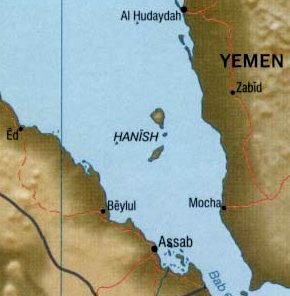
The Hanish Islands conflict was a dispute between Yemen and Eritrea over the island of Greater Hanish in the Red Sea,one of the largest in the then disputed Zukur-Hanish archipelago. Fighting took place over three days from 15 December to 17 December 1995. In 1998 the Permanent Court of Arbitration determined that the territory belonged to Yemen.

The Eritrean Cabinet of Ministers is headed by the President of Eritrea,Isaias Afwerki.
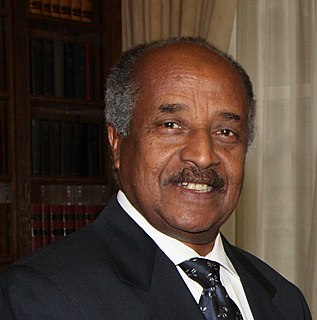
Osman Saleh Mohammed was the first Minister of Education for Eritrea following Independence,serving in that position from 1993 to 2007. He has oversaw the transition from the revolutionary EPLF school system to a national education system.

The history of the Jews in Eritrea stretches back many centuries. Eritrea once had a substantial Jewish community,fueled by immigrants arriving for economic reasons and to escape persecution. The community thrived for several decades before mass emigration began during the Eritrean War of Independence with Ethiopia.
Semere Russom began his professional life as a teacher. He traveled to the United States as a student at the University of Oklahoma,but terminated his studies in 1976 to serve in the Eritrean People's Liberation Front.
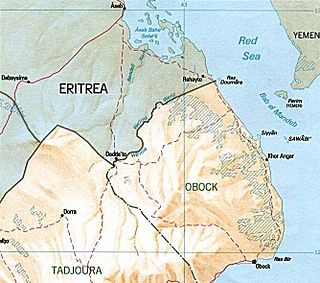
The Djiboutian–Eritrean border conflict between the forces of Djibouti and Eritrea occurred between June 10 and June 13,2008. It was triggered by tension which began on April 16,2008,when Djibouti reported that Eritrean armed forces had penetrated into Djibouti and dug trenches on both sides of the border. The crisis deepened when armed clashes broke out between the two armed forces in the border area on June 10,2008. During the conflict,France provided logistical,medical and intelligence support to Djibouti,but did not participate in direct combat.

Eritrea–Yemen relations refers to the current and historical relationship between Eritrea and Yemen. The states fought briefly over the Hanish Islands in the Red Sea in 1995. In 2004,Eritrean President Isaias Afewerki was invited to and visited Yemen for a two-day working visit. He was accompanied by a number of government ministers and high-ranking military personnel,including foreign minister Ali Said Abdella.
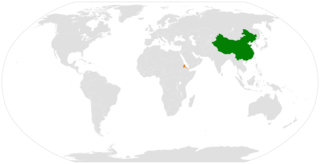
China–Eritrea relations refers to the current and historical relationship between China and Eritrea. Eritrea gained independence from Ethiopia in 1993 and,as of 2007,relations between the two states registered "smooth growth".
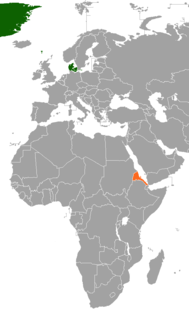
Denmark–Eritrea relations refers to the current and historical relations between Denmark and Eritrea. Denmark is represented in Eritrea through its embassy in Nairobi,Kenya,and Eritrea is represented in Denmark through its embassy in Stockholm,Sweden. Diplomatic relations were established in 1993. Relations between Denmark and Eritrea have been bad,since Denmark decided to suspend development cooperation with Eritrea in January 2002,and close its embassy in June 2002. After the Eritrean–Ethiopian War from 1998 to 2000,Denmark sent 320 soldiers to the United Nations Mission in Ethiopia and Eritrea to monitor a ceasefire in the border war.

The Ministry of Foreign Affairs of Eritrea is a government ministry which oversees the foreign relations of Eritrea. Eritrea's current Minister of Foreign Affairs is Osman Saleh Mohammed,since 2007.

Denmark–Ethiopia relations refers to the current and historical relations between Denmark and Ethiopia. Denmark has an embassy in Addis Ababa,and Ethiopia is represented in Denmark through its embassy in London. Diplomatic relations were established in the 1960s and since then the relations between Denmark and Ethiopia have had their ups and downs. In 2008,Ethiopian exports to Denmark amounted to 6,5 million DKK,while Danish exports amounted to 40,3 million DKK. Denmark provides aid and assistance to Ethiopia through the Danish International Development Agency (DANIDA). Ethiopia is a partner country for the DANIDA.
Eritrean Americans are an ethnic group of Americans who are of full or partial Eritrean national origin,heritage and/or ancestry. As of 2013,there are 33,930 Eritrean-born citizens living in the U.S.

Eritrea–India relations refers to the international relations that exist between Eritrea and India. Eritrea maintains an embassy in New Delhi. India maintains an embassy in Asmara since 2021. Erstwhile,India was represented to Eritrea through its High Commission in Khartoum,Sudan.
The 2018 Eritrea–Ethiopia summit was a bilateral summit that took place on 8–9 July 2018 in Asmara,Eritrea,between Eritrean President Isaias Afwerki and Ethiopian Prime Minister Abiy Ahmed and officials from the two countries.

The General debate of the sixty-third session of the United Nations General Assembly was the first debate of the 63rd Session of the United Nations General Assembly that ran from 23 –29 September 2008. Leaders from a number of member states addressed the General Assembly.
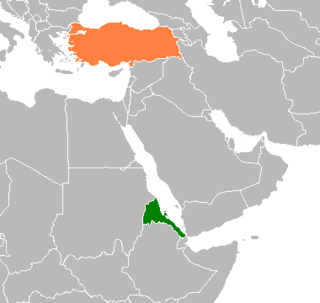
Eritrea–Turkey relations are the foreign relations between Eritrea and Turkey. Turkey has an embassy in Asmara since 2013,while Eritrea does not have an embassy in Turkey but the Turkish embassy in Doha,Qatar,is accredited for Eritrea. Turkey was one of the first countries to recognize Eritrea in 1993 and both countries established diplomatic relations in the same year.

Eritrean–Kosovar relations are foreign relations between Eritrea and Kosovo. Formal diplomatic relations between two states are non-existent as Eritrea does not recognize Kosovo as a sovereign state.













